The Lists of Others: SciFi Series
Why? Take a look and see why...
* * * * * * * * * * * * * * * * * * * * * *
15. Masters of Science Fiction (ABC): As an anthology series in the 2000s, it’s not like it ever had a chance in Hell of surviving, anyway, which is why it comes in at the bottom of the list. Still, it deserves mention here, partially because it was really good, but mostly because it got an even bigger shaft from ABC than “New Amsterdam” got from Fox.
Get this: during ABC’s executive panel during the TCA Press tour of summer 2007, someone asked Stephen McPherson, the network’s president of entertainment about the origins of the series, and he responded, “It was a low-cost initiative that we tried. We did this series of movies to see if there was a way to spark something different at a really low cost point. You know, I think there is some good work done there, but it’s very unseen. So it’s just been…it’s been a little bit problematic.” Okay, now, to be fair, he’s acknowledging that there’s “good work” inherent somewhere in the series, but to put these comments in a better perspective, they were made before the show had even premiered. And how did he decide to remedy this problem of the series being “unseen”? By premiering it at 10 PM on Saturday night. Hey, way to get behind your programming, Steve!
In fairness, I’m sure no one, not even the series creators, ever expected “Masters of Science Fiction” to be anything other than a short-lived midseason entry, but it’s not like it had to be. The series harked back to classic dramatic anthologies like “The Twilight Zone,” “The Outer Limits,” and the like, and while its budget might not be through the roof, the performances – including turns from Malcolm McDowell, Anne Heche, Sam Waterston, Judy Davis, Terry O’Quinn, Elizabeth Rohm, Brian Dennehy, and John Hurt – were top-notch. But, then, that’s what happens when you bring in directors like Mark Rydell (”On Golden Pond”), Michael Tolkin (”The Player”), and Jonathan Frakes (”Star Trek: First Contact”) to helm adaptations of stories by Robert Heinlein (”Starship Troopers”), Howard Fast (”Spartacus”), and legendary sci-fi writer Harlan Ellison, who actually adapted his own story, collaborating with Josh Olson (”A History of Violence”). If any of this sounds like it might be up your alley, you can at least take comfort in the knowledge that the entire series is available on DVD, including two episodes that ABC couldn’t be bothered to air.
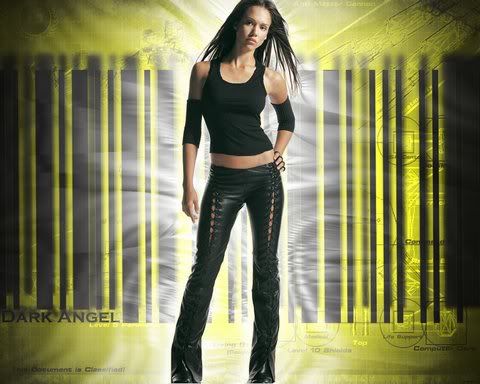
14. Dark Angel (Fox): Nowadays, it’s best remembered for the fact that it introduced the world at large to the assets of Jessica Alba (which, by the way, look damned good in black leather), but when “Dark Angel” premiered, its high profile came from the fact that it was the first thing that it was produced by James Cameron. What not nearly as many people remember, however, is that the show also starred Michael Weatherly, who would get a much longer running gig a few years later when he took on the role of Anthony DiNozzo in “NCIS,” and Jensen Ackles, now better known as Dean Winchester on “Supernatural.”
But I digress. The slightly-futuristic (it took place in 2019) “Dark Angel” was predominantly about Alba’s character, Max Guevara, a genetically enhanced super-soldier who has escaped from the government that created her and is using her job as a motorcycle courier to cover for the fact that she spends most of her time searching for her brethren, i.e. the other 11 super-soldiers who escaped with her. She does this with the help of Logan Kale (Weatherly), a.k.a. cyber-journalist “Eyes Only,” whose unparalleled computer skills go a long way toward making up for the fact that he’s paralyzed from the waist down. The series looked great, and having John Savage serve as one of its primary villains (Colonel Donald Michael Lydecker) was inspired, but trying to get the general public to embrace the cyberpunk movement – even the highly diluted version of it that “Dark Angel” offered – was a lost cause. Truth be told, we’re probably lucky that we got as much of the show as we did. If Cameron’s name hadn’t been on it, it probably would’ve been over at the end of Season 1.
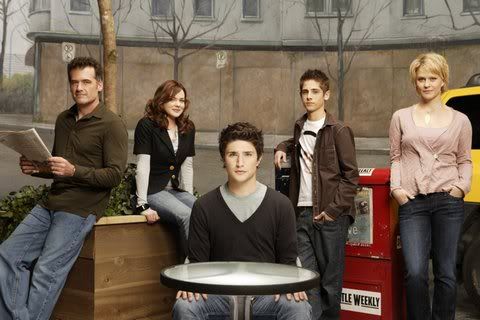
13. Kyle XY (ABC Family): Ironically, I’m writing this mere moments after getting word that a copy “Kyle XY: The Final Season” has just been sent my way. Even if you aren’t familiar with the series, you’ll nonetheless have deduced from the appearance of the word “final” in the set’s subtitle that this isn’t a show that came and went within the span of a single season. Yes, “Kyle XY” actually lasted for three seasons, but it was still going strong creatively when ABC Family decided that it just didn’t match up well enough with their other content, like “Greek” or “The Secret Life of the American Teenager.” Now, look, I dig those shows as much as the next thirtysomething who wants to vicariously relive his youth through semi-realistic TV characters, but is that any reason to kill off a great sci-fi melodrama like “Kyle”? No, sir, it is not.
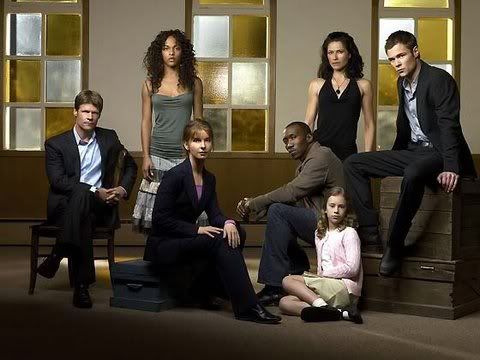
12. The 4400 (USA): If I’m to be completely honest, I’m much more of a fan of this show’s concept that I ultimately was of its execution. When a series kicks off by depositing a group of exactly 4400 people at the foothills of Mount Rainier, each of whom had disappeared at various times from 1946 onward but haven’t aged a moment since then and don’t remember where they’ve been…I mean, damn, how can you not be intrigued? And the premise further expands to reveal that several members of the 4400 have begun to develop paranormal abilities, that’s icing on the cake! But while I loved the episodes which focused on individual members of the group and how they dealt with their return, I wasn’t nearly as enthralled with the ongoing storylines with the regular cast members. Still, when it was good, it was really, really good, and with well over 4300 stories left to be told, I have to imagine that, statistically speaking, there would’ve been quite a bit more sci-fi goodness yet to come.
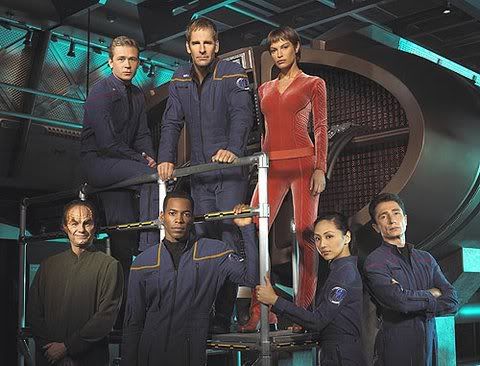
11. Star Trek: Enterprise (UPN): No series wants to be remembered as the worst in its franchise, but you’d be hard pressed to find any “Star Trek” fan that wouldn’t use that label on “Enterprise.” The concept of stepping back in time to the pre-Kirk era and exploring the origins of Starfleet Command and the United Federation of Planets was unquestionably an intriguing one, but Rick Berman – who took the “Trek” reigns of command when Gene Roddenberry died – seemed insistent on rewriting established canon than putting together a good TV show. So why should such a mediocre series have continued? Because in its 4th season, uber-fans Judith and Garfield Reeves-Stevens came aboard the writing staff and turned things around in a big way, providing tributes to the original series and “The Next Generation” every time you turned around. The ratings didn’t change, though, and “Enterprise” was canceled. Give Berman credit, though: he managed to stab at us from Hell’s heart one last time by offering up an absolutely crap-tacular series finale.
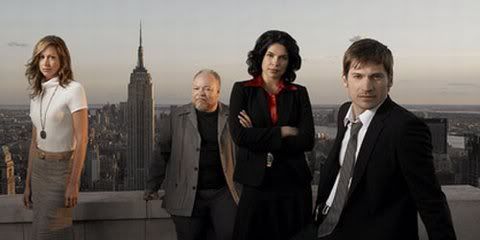
10. New Amsterdam (Fox): When I think of this series, I always think of the panel for the show during the TCA Press Tour, when one of the journalists just absolutely refused to accept that the creators of “New Amsterdam” had never seen “Highlander.” I mean, seriously, it was starting to get ugly. The funny thing, though, is that aside from the fact that the lead character of the series was an immortal, the comparisons really weren’t all that dramatic.
The show was about John Amsterdam (Nikolaj Coster-Waldau), a NYPD homicide detective who’s 400 years old but looks 35. That’s because, way back in 1642, Amsterdam saved the life of a Native American girl, who in turn cast a spell that granted him immortality, with the caveat that his aging would resume when he found his one true love…which was darned nice of her, because, really, no one should have to outlive the love of their life. Though you’d expect the show to spend the majority of its time on Amsterdam’s search for his love, “New Amsterdam” didn’t take the obvious route. Instead, it spent a great deal of its time exploring the long life of its titular character, revealing that he’d been in the Army three times and also did time in the Navy, Marines, and Coast Guard (but not the Air Force, ostensibly due to a fear of heights), served as a doctor during the Civil War, worked for the CIA, taught history, made furniture, and – at some point – became an alcoholic. (He’s been in AA since 1965.)
I’ve never really gotten a handle on why “New Amsterdam” was so disliked by Fox, but it’s clear that it was. It was supposed to have premiered in the fall of 2007, but then they stopped production after the first seven episodes had been completed and proceeded to sit on the series until mid-season; once it finally got on the air, they did very little promotion on it, making it completely unsurprising when they pulled the plug on it. I’m still mystified. Like “Journeyman,” the romantic bent of the show was one which seemed perfect for cross-demographic success, but they never even gave it a chance.
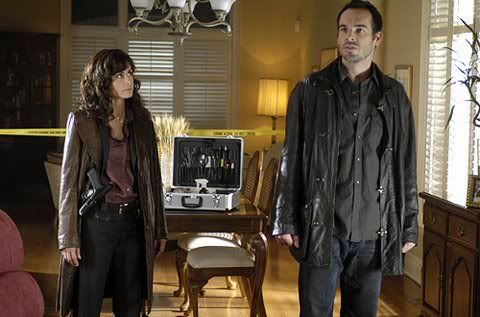
9. The Dresden Files (Sci Fi): As someone who stepped into this series without having read any of the Jim Butcher novels which served as its inspiration, maybe I had an advantage, because fans of the literary franchise seemed to universally hate this adaptation. Me, I thought it was pretty cool. Paul Blackthorne played Harry Dresden as a cocky wizard who helped out the police department with their more eccentric cases, i.e. the ones that would be classified as supernatural if anyone on the force dared to claim a belief in such things, and the series managed to have a decidedly dark tone while still maintaining a sense of humor. But when you kick off a TV series by instantly alienating the majority of the people who made it a success as a book series, you’re pretty much doomed to failure, which is what “The Dresden Files” proved to be.
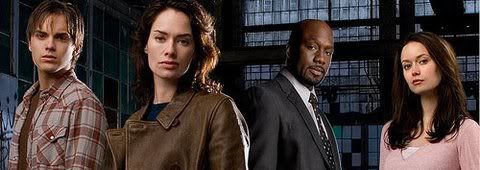
8. Terminator: The Sarah Connor Chronicles (Fox): Here’s one one that we already detailed elsewhere, but, again, it deserves repeating that, when “The Sarah Connor Chronicles,” it did so far too soon. Season 1 had its highs and lows, but the show’s sophomore year was consistently intriguing throughout, starting with the season premiere and the introduction of Catherine Weaver (Shirley Manson), the co-founder and current CEO of ZeiraCorp…except that, as we discovered immediately prior to the closing credits, she wasn’t actually Catherine Weaver but, indeed, was a shapeshifting T-1001. As the season progressed, however, her physical transformation became less interesting than her emotional evolution, with the T-1001 being forced to maintain the façade of its new identity in its entirety, which required her to raise Catherine’s daughter, Savannah (Mackenzie Smith), and try to understand her. (I have a suspicion that all of the parents in our readership just snorted en masse and said, “Uh, yeah, good luck with that!”)
The T-1001 wasn’t the only Terminator to get a crash course in humanity during Season 2. Cameron (Summer Glau) spent much of the season suffering from a serious chip malfunction, leading her at one point to adopt the approximate memories of future resistance fighter Allison Young, on whom her personality had originally been patterned, but we also saw her interacting outside of the Connor camp; elsewhere, the Terminator formerly known as Cromartie (Garret Dillahunt) had his chip destroyed, but his body was connected to ZeiraCorp’s artificial intelligence known as the Babylon A.I., leading him to take on a new name – John Henry – and leading the series to explore matters of spirituality by querying whether his sentience means that terms like “life” and “death” now apply to him. Oh, right, and there was also some pretty good stuff with the human characters, too.
Sure, there were moments which defied credibility, but when you’re dealing with a show that lives and dies by time travel, suspension of disbelief and acceptance of pretty much everything that’s handed to you is a necessity. Fortunately, executive producer Josh Friedman found a way to combine the necessary technological components of “Terminator” with deep characterization. It seriously sucked that “The Sarah Connor Chronicles” was canceled just as those who’d followed it from the beginning were really feeling rewarded for their steadfast viewership, but it was just insult to injury when “Terminator: Salvation” bombed, taking down any decent chance that the series might be revisited at some point.
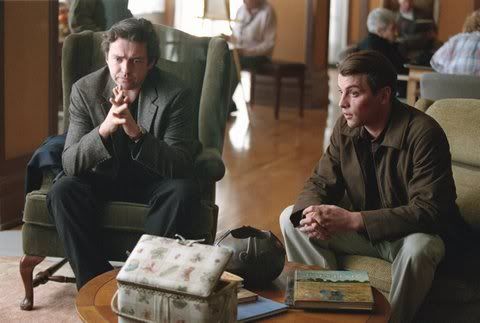
7. Miracles (ABC): I feel a little weird about including a show with religious themes in the midst of a list about sci-fi series, but when even the show’s creator – Richard Hatem – is willing to acknowledge that it bounces back and forth between religious phenomena and paranormal phenomena, it’s hard to argue against its place here.
Starring a pre-”Jericho” Skeet Ulrich, “Miracles” introduced viewers to Paul Callan, an investigator of modern miracles for the Catholic Church at the Archdiocese of Boston. Though he’s dealing with the inevitable frustration of disappointing groups of believers each time he investigates and disproves the authenticity of their “miracles,” Paul’s faith is restored after he’s involved in a car accident: not only does he have a first-hand experience with a young boy’s ability to heal, but when his injuries lead to blood spatter on the windshield, he watches in astonishment as his his blood forms the words, “God Is Now Here.” But, wait, hang on: maybe it actually said, “God is Nowhere.”
Either way, these events lead to a schism between Paul and the church when his report on the incidents is dismissed, but he soon crosses paths with Alva Keel (Angus Macfadyen), who propositions him with a job offer at his organisation, Sodalitas Quaerito (“Brotherhood in search of truth”). From there, “Miracles” followed Paul, Alva, and Evelyn Santos (Marisa Ramirez) as they crossed the globe and investigated various phenomena, some less religious than others but all connected to life, death, and the afterlife in some fashion, rather like a spiritual version of “The X-Files.” Unfortunately, the series was manhandled by ABC, running three episodes, then preempting it for three weeks, then moving it all over the schedule. No wonder it never caught on. With that kind of treatment, it would’ve been a miracle if it had.
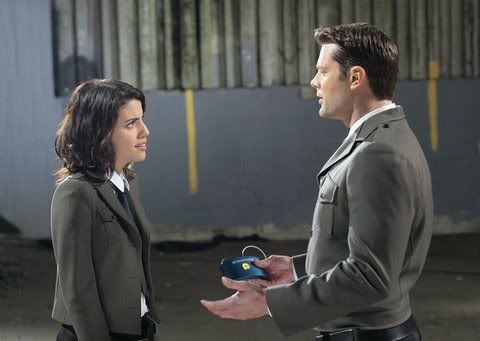
6. The Middleman (ABC Family): I used to say that the reason this series failed was that ABC Family was the wrong network for it, but when I spoke with the show’s creator, Javier Grillo-Marxuach, he set me straight and assured me that they were the right network. Why? Because they let him do it. “It would have been very easy for any group of people to pick up the show and say, ‘Gosh, we really like the idea of this girl fighting monsters, but can you make her sexier and kind of make the dialogue a little bit more accessible and make the sensibility of the show a little bit more accessible?’” he said. “And to ABC Family’s credit, they never asked me to do that.” When you go back and watch the show from start to finish (which is easy to do, what with Shout Factory having released a complete-series set), you really get a feel for the kind of freedom that Grillo-Marxuach was granted, but it still must be said that “The Middleman” might have been better served in the ratings if it had aired on a network that more readily catered to unabashed geeks. Or, then again, maybe it wouldn’t have. Given that the dialogue flies fast and furious, like a Kevin Smith movie on speed, and the amount of science fiction and fantasy concepts thrown at the viewer are only matched by the number of references to science fiction and fantasy movies and TV series, maybe it was always destined to be a future cult series.
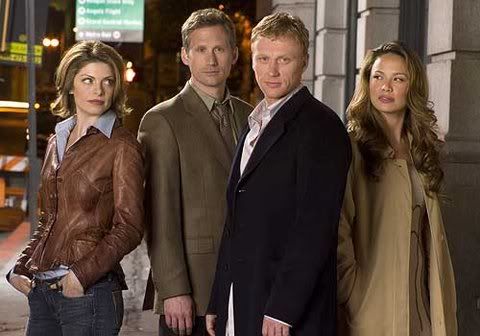
5. Journeyman (NBC): What’s this? Another “Bullz-Eye” favorite? Certainly, several of us on the staff were thrilling to the weekly adventures of reporter Dan Vasser (Kevin McKidd) as he involuntarily traveled through time, doing so as much to see the next cool set piece – I particularly loved it when he was on a smoke-filling flight during the 1970s – as to find out how his unexpected disappearances and impossible-to-predict returns would wreak havoc on his life in the present. It was also unique for a sci-fi series in that it was unabashedly romantic, with Dan trying to reconcile his love for his wife in the present (Gretchen Egolf) with the revelation that his former fiancee (Moon Bloodgood), who he’d believed to be dead, was actually alive, well, and a fellow time traveler.
I talked to producer Kevin Falls at a point when the fate of “Journeyman” was in limbo, and he was understandably frustrated at the way the network was treating the series, even if he understood that they obviously had more stake in saving the shows that were produced by NBC-Universal. (“Journeyman” was a Fox production.) When I pitched the idea of moving from series to movie, a la “Firefly,” he was enthusiastic but realistic about the suggestion. “I would do anything to keep this show alive,” he said. “If there was interest and somebody wanted to make a movie, nothing would make me happier. But I have to be realistic: Joss Whedon had quite a following, and I don’t know that Kevin Falls has quite that following.” Unfortunately, it appears that he was right: not only was “Journeyman” canceled, but it wasn’t even released on DVD after its cancellation.
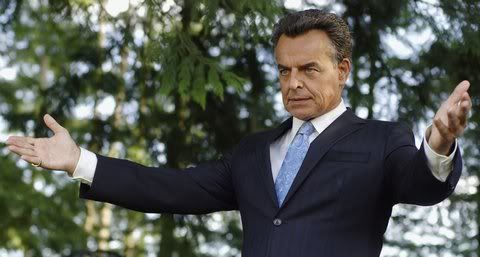
4. Reaper (The CW): I think this cancellation hurt more folks at Bullz-Eye than any other in this list. It’s a bold statement, but when you look back at our TV Power Rankings, you’ll see that I’m not kidding. Of course, its success there is probably – but not definitely – why got it canceled, but, dammit, we had to show our love. The trifecta of slackers in “Reaper” were great, but let’s not kid ourselves: as much as we laughed at their antics, it was Ray Wise who kept us coming back every week. It’s a crime that that man never got an Emmy nomination for his work as the Devil. Series creators Michele Fazekas and Tara Butters had a lot of battles with The CW about their desire to expand on the mythology of the show (the network, as is so often the case, was more comfortable with self-contained episodes), and given that the duo had departed by the end of the show’s second season, it’s a fair bet that Season 3 wouldn’t have been the same “Reaper” that we’d come to know and love, anyway. But, man, we sure would like it if Fazekas and Butters could find the backing to do a “Reaper” movie…and we have it on good authority that Bret Harrison and Tyler Labine would be back in a flash. So what are you waiting for, Hollywood? Let’s get moving on this thing!
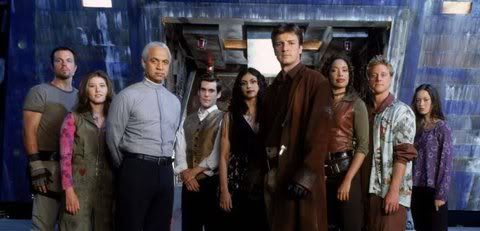
3. Firefly (Fox): I feel like the majority of what I might have to say about this series has probably already been said somewhere within Bob Westal’s love letter to Joss Whedon’s best work of the 2000s…and if Bob himself didn’t say it, then surely one of the folks who commented on it did. Still, I’ll go ahead and throw in my two cents worth and reconfirm that, yes, the idea of a Western set in space was indeed a wonderful one…and it would’ve worked, too, if it wasn’t for those pesky network executives at Fox. As someone who literally grew up in the world of television (his father, Tom Whedon, was one of the original writers for “Captain Kangaroo” and went on to serve as the head writer of “The Electric Company”), Whedon tried to kick it old-school with “Firefly” by starting things off with a two-hour pilot to set the stage for the series. Fox, however, decided it would be a better move to just dump viewers into the deep end and had the series debut with the second episode instead. I think we all know how well thatplan worked.
“Firefly” was set in the 2500s and offered a less than upbeat look into the future, suggesting that, although technology had reached a point where gravity-drive engines made travel beyond our solar system possible, things were pretty tough all over. Earth’s population was such that people pretty much had to leave the planet if they wanted to survive, but while terraforming had allowed humanity to set up colonies on many different planets, their existence tended toward the rough-and-tumble, not unlike America’s wild west during the late 1800s. As such, Whedon took several stereotypes of the era – cowboy, preacher, hooker with the heart of gold, blacksmith, doctor, and even stagecoach driver – and tweaked them to fit his new premise. Nathan Fillion’s performance as Captain Mal was such a career-defining role that he spent seven years trying to find another one that worked as well for him (you can bet that he kissed the sky when he got word that “Castle” had received a second-season pick-up), and Summer Glau’s creepy vibe while playing the troubled River was no doubt directly responsible for earning her the later role as a Terminator on “The Sarah Connor Chronicles,” but like Whedon’s other shows, the whole ensemble played well together from the start. “Firefly” had enough of a following to move from cancellation to the silver screen, but while the odds of ever seeing a sequel to “Serenity” are pretty slim, hey, it’s more of an afterlife than any other show on this list had.
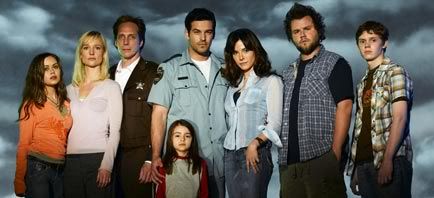
2. Invasion (ABC): More love for another favorite of the Power Rankings. The premise of the show, more or less, was that a race of aliens had begun their takeover of Earth by slowly infiltrating the residents of a small town and possessing them…or bonding with them…or maybe they replaced them altogether but just retained their memories. I can’t quite recall – it’s been a fair while since I’ve revisited the series – but I’m not entirely sure that re-screening all 22 episodes would necessarily provide me with a definitive answer. There were a lot of mysteries lurking within “Invasion,” and creator Shaun Cassidy had big plans to considerably expand upon the mythos of the series in future seasons, but, as we know, he never got that opportunity.
“Invasion” was, at its heart, a show about family. You’ve got Sheriff Tom Underlay (William Fichtner), whose wife, Mariel (Kari Matchett), is the ex-wife of park ranger Russell Varon (Eddie Sibrian); Tom has a daughter from his first marriage (Alexis Dziena), and Mariel and Russell have a daughter (Ariel Gade) and a son (Evan Peters), plus Russell is remarried, and he and his wife Larkin (Lisa Sheridan) – who’s expecting – live with Larkin’s brother, Dave (Tyler Labine), an amiable conspiracy nut who regularly blogs about his theories…which, yes, include the possibility of alien invasion. Yes, the show had its faults, most notably an insistence on spending too much time on teen angst, but as the season progressed, “Invasion” evolved into must-see sci-fi TV. The concept that the aliens weren’t always successful in their attempts to possess their human hosts was an intriguing one, as was the question posited as the series progressed: what if an alien race wanted to infiltrate Earth but their ranks were divided on how to go about it? Unfortunately, this mystery and all of the others within “Invasion” remain unsolved.
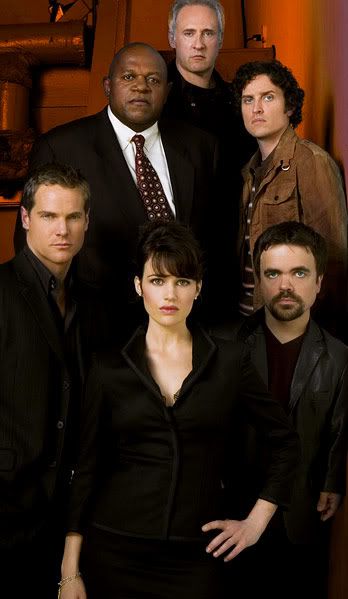
1. Threshold (CBS): Dr. Molly Anne Caffrey (Carla Gugino) is a crisis management consultant for the US government who gets a major surprise when her worst-case-scenario plan for what to do in case of an alien invasion is activated. Pulls together a team of experts, including microbiologist Dr. Nigel Fenway (Brent Spiner, “Star Trek: The Next Generation”), linguist Arthur Ramsey (Peter Dinklage, “The Station Agent”), and aerospace engineer Lucas Pegg (Robert Patrick Benedict, “Felicity”), the group begin to investigate the aliens in order find out if they’re hostile or not. Hey, guess what? They totally are! Produced by Brandon Braga and David S. Goyer, both possessing seriously strong sci-fi backgrounds (“Star Trek” and “Blade,” respectively), “Threshold” did a really good job of building the histories of the characters, exploring the aliens and making them legitimately terrifying, and, perhaps most intriguingly, presenting a realistic view of how the government would probably handle such a situation, with various senators being let in on the top-secret organization out of necessity so that funding would continue. Although the series only lasted for 13 episodes, “Threshold” had actually been designed for three specific plot arcs, with its creators planning to change the title accordingly for each: “Threshold” was meant to indicate that the aliens had made contact, and from there it would’ve moved on to the self-explanatory “Foothold,” followed by “Stranglehold,” wherein the aliens would’ve overthrown the indigenous population – that’d be us – and become the overlords.
With such an awesome cast and a solid creative team, it’s still shocking to me that the series never took off, especially when you consider that, while it certainly maintained regularly-progressing plotlines, “Threshold” had an arguable advantage over the rest of these series by not ending each episode with a cliffhanger…or, in other words, you could miss an episode and not be completely and totally lost the next time you tuned in. Maybe the problem came from the tussle between the network and the show’s creative team. “It was always intended to be a serialized show,” said Goyer in a 2009 interview with Bullz-Eye. “Once we got going into the series, (CBS) wanted episodes to be more closed ended. And they have had a lot of success with that, but we hadn’t really designed it for that, so it felt like we were stalling…and I think the audience unfortunately sensed that as well.” That’s just the sort of thing you’d expect a frustrated creator to say, and you can’t blame him, but the potential for the show was so tremendous that it never occurred to me that they were stalling. I just thought they were just building anticipation.
* * * * * * * * * * * * * * * * * * * * * *
Top 10 Unsung Science Fiction TV Classics
Some of the greatest science fiction TV shows of all time have vanished, almost without a trace. They don't get DVDs or listed in articles on the "Top 50 Science Fiction Shows Of All Time." Despite achieving true greatness, they don't even get as much praise or critical attention asAlf. Here's our countdown of the ten greatest unappreciated masterpieces of science fiction television.
We're focusing on really unsung series here, which means the list doesn't include shows like Babylon 5, Star Trek: Deep Space Nineor Blake's 7, which get plenty of love. Also, we're not including any shows currently on the air, on the theory that they could still get more love.
10. Space Island One (1998)
Why it's unsung: This German/Canadian co-production isn't out on DVD, and all of the websites about it have been down for a few years. There aren't even any clips on YouTube.
Why it rules: This is one of the most hard-science-focused SF shows. The crew of a corporate-funded space station mostly deals with scientifically plausible problems (with a couple of exceptions) and the stories focus on the ethical problems that come with profit-focused science. Yes, some episodes are a tad slow-moving, but the best dozen eps feature high drama and high weirdness. Sample plot lines: a lonely old NASA astronaut spends thousands of dollars calling 900 sex lines from the space station. The station gets the world's last sample of smallpox for safe-keeping, and the crew debates whether to destroy it.
Why it's unsung: This German/Canadian co-production isn't out on DVD, and all of the websites about it have been down for a few years. There aren't even any clips on YouTube.
Why it rules: This is one of the most hard-science-focused SF shows. The crew of a corporate-funded space station mostly deals with scientifically plausible problems (with a couple of exceptions) and the stories focus on the ethical problems that come with profit-focused science. Yes, some episodes are a tad slow-moving, but the best dozen eps feature high drama and high weirdness. Sample plot lines: a lonely old NASA astronaut spends thousands of dollars calling 900 sex lines from the space station. The station gets the world's last sample of smallpox for safe-keeping, and the crew debates whether to destroy it.
9. Star Cops (1987)
Why it's unsung: This show about a police squad in the "Wild West" of space stations and moonbases suffered from a cheesy title and a ridiculous ELO-esque theme tune. (Which I've sort of gotten to love, for some dumb reason.)
Why it rules: Series creator Chris Boucher wrote some of the best episodes of the original Doctor Who, and then masterminded the scripts for Blake's 7. Several Star Cops episodes feature tons of Boucher's trademark razor-sharp dialog, plus the show fumbles towards a space-noir aesthetic, with the cop squad including a bribe-taker and a thuggish slob.
Why it's unsung: This show about a police squad in the "Wild West" of space stations and moonbases suffered from a cheesy title and a ridiculous ELO-esque theme tune. (Which I've sort of gotten to love, for some dumb reason.)
Why it rules: Series creator Chris Boucher wrote some of the best episodes of the original Doctor Who, and then masterminded the scripts for Blake's 7. Several Star Cops episodes feature tons of Boucher's trademark razor-sharp dialog, plus the show fumbles towards a space-noir aesthetic, with the cop squad including a bribe-taker and a thuggish slob.
8. Surface (2005-2006)
Why it's unsung: Cancelled after just one season, this show about undersea intrigue failed to rope in the kind of audiences who were devouring Lost's tangled mysteries.
Why it rules: Dude, it had sea monsters! And there was a government coverup! And we had a strong female character — a scientist, even — investigating the emergence of a new and potentially world-ending form of sea life. And we never got to learn what was really going.
Why it's unsung: Cancelled after just one season, this show about undersea intrigue failed to rope in the kind of audiences who were devouring Lost's tangled mysteries.
Why it rules: Dude, it had sea monsters! And there was a government coverup! And we had a strong female character — a scientist, even — investigating the emergence of a new and potentially world-ending form of sea life. And we never got to learn what was really going.
7. Odyssey 5 (2002)
Why it's unsung: This Canadian show about space shuttle astronauts who witness the destruction of Earth never got enough publicity during its initial U.S. run on Showtime. It felt like an attempt to do a mature extended-cable show like Big Love, only with a science fiction premise, and it failed to reach either audience. Showtime didn't even bother to show all of the first season, until 2004.
Why it rules: The main characters are all well-rounded and flawed. And the show's set-up, in which an alien sends their consciousnesses back in time five years to try and avert the world's destruction, generates tons of potential. The show is appearing intermittently on Sci Fi, and it's worth catching despite the inconclusive ending. The show was created by Manny Coto, who went on to mastermind the final season of Star Trek: Enterprise.
6. Journeyman (2007)Why it's unsung: This Canadian show about space shuttle astronauts who witness the destruction of Earth never got enough publicity during its initial U.S. run on Showtime. It felt like an attempt to do a mature extended-cable show like Big Love, only with a science fiction premise, and it failed to reach either audience. Showtime didn't even bother to show all of the first season, until 2004.
Why it rules: The main characters are all well-rounded and flawed. And the show's set-up, in which an alien sends their consciousnesses back in time five years to try and avert the world's destruction, generates tons of potential. The show is appearing intermittently on Sci Fi, and it's worth catching despite the inconclusive ending. The show was created by Manny Coto, who went on to mastermind the final season of Star Trek: Enterprise.
Why it's unsung: The first few weeks this time-travel show was on, its nickname was: "Gah, post-Heroes buzzkill!" The drama of Kevin McKidd struggling to hold onto his job and his marriage, while he kept slipping into the past, just felt a bit too draggy. But then something funny happened: Heroes started being the pain we endured to get to the reward of Journeyman.
Why it rules: The mystery of why Dan Vasser is traveling in time gets more intriguing, once a weird physicist starts spouting about wormholes. And all of the characters get more nicely complex as the show goes along. Most of all, though, all of Dan's meddling in the timestream has consequences he can't predict — and they only pile up more alarmingly over time.
5. Lexx (1997-2002)
Why it's unsung: At least in the U.S., this Canadian show never quite crossed over and gained a broader audience.
Why it rules: Just the fact that they're in a planet-eating bug ship is good enough for me. Not to mention the weird robot head with the love-slave programming implanted in it, while the cluster lizard/slavegirl who was supposed to get the programming runs free. It's a weirdly campy show, but actually has moments of genuine greatness.
Why it's unsung: At least in the U.S., this Canadian show never quite crossed over and gained a broader audience.
Why it rules: Just the fact that they're in a planet-eating bug ship is good enough for me. Not to mention the weird robot head with the love-slave programming implanted in it, while the cluster lizard/slavegirl who was supposed to get the programming runs free. It's a weirdly campy show, but actually has moments of genuine greatness.
4. Star Trek: The Animated Series(1973-1974)
Why it's unsung: I know: How can a Star Trek series be unsung? But this one really is. It only recently got a DVD release, and people often skip over it in discussing Treklore.
Why it rules: Thanks to a writer's strike that didn't apply to animation, the show managed to get some decent science fiction writers to contribute scripts, including Larry Niven and Larry Brody, plus original series veterans like David Gerrold and D.C. Fontana. The episodes are pretty fast-paced, thanks to their 22-minute runtimes, but that doesn't stop them dealing with ambitious ideas like antimatter universes, an "ultimate weapon" and time paradoxes.
Why it's unsung: I know: How can a Star Trek series be unsung? But this one really is. It only recently got a DVD release, and people often skip over it in discussing Treklore.
Why it rules: Thanks to a writer's strike that didn't apply to animation, the show managed to get some decent science fiction writers to contribute scripts, including Larry Niven and Larry Brody, plus original series veterans like David Gerrold and D.C. Fontana. The episodes are pretty fast-paced, thanks to their 22-minute runtimes, but that doesn't stop them dealing with ambitious ideas like antimatter universes, an "ultimate weapon" and time paradoxes.
3. Farscape (1999-2004)
Why it's unsung: Even for a Sci Fi Channel series whose name doesn't rhyme with "cattle car,"Farscape flew under the radar. The muppet-esque Henson animatronic character probably made a lot of people think it was a kids' show.
Why it rules:Farscape had smart writing, good science and believable aliens — plus, it featured Scorpius as a villain Crichton's head long before BSG ever did the head-villain thing. Plus, we love the Moya, the living ship that Crichton finds himself on. The Sci Fi Channel is supposedly going to make 10 webisodes, but their status is uncertain.
Why it's unsung: Even for a Sci Fi Channel series whose name doesn't rhyme with "cattle car,"Farscape flew under the radar. The muppet-esque Henson animatronic character probably made a lot of people think it was a kids' show.
Why it rules:Farscape had smart writing, good science and believable aliens — plus, it featured Scorpius as a villain Crichton's head long before BSG ever did the head-villain thing. Plus, we love the Moya, the living ship that Crichton finds himself on. The Sci Fi Channel is supposedly going to make 10 webisodes, but their status is uncertain.
2. Adventures of Brisco County, Jr.(1993-1994)
Why it's unsung: This sci-fi Western ran in the "Friday night death slot," and breathed its last after only one season. Like many of the shows on this list, it has a cult following, but seldom gets much props as a science fiction show. And star Bruce Campbell in general deserves way more accolades than he ever gets.
Why it rules: It smudged genre lines with total abandon, and you never knew what sort of crazy gadgets would turn up, from an otherworldly superpowered orb to the Mobile Battle Wagon and the Amazing Rocket Car. Co-creator Carlton Cuse now works on Lost.
Why it's unsung: This sci-fi Western ran in the "Friday night death slot," and breathed its last after only one season. Like many of the shows on this list, it has a cult following, but seldom gets much props as a science fiction show. And star Bruce Campbell in general deserves way more accolades than he ever gets.
Why it rules: It smudged genre lines with total abandon, and you never knew what sort of crazy gadgets would turn up, from an otherworldly superpowered orb to the Mobile Battle Wagon and the Amazing Rocket Car. Co-creator Carlton Cuse now works on Lost.
1. Max Headroom (1987-1988)
Why it's unsung: It's still not out on DVD, except for an out-of-print DVD of the original UK TV movie. The show has a cult following, but not as much as it deserves.
Why it rules: This cyberpunk show was prophetic in so many ways — TV ads feel so geared to short attention spans and DVR-skipping, they might as well be "blipverts." — and paranoia and corporate dystopias have seldom been so entertaining
Why it's unsung: It's still not out on DVD, except for an out-of-print DVD of the original UK TV movie. The show has a cult following, but not as much as it deserves.
Why it rules: This cyberpunk show was prophetic in so many ways — TV ads feel so geared to short attention spans and DVR-skipping, they might as well be "blipverts." — and paranoia and corporate dystopias have seldom been so entertaining
* * * * * * * * * * * * * * * * * * * * * *
10 Best Sci-Fi TV Shows
I started this blog with a list of the 10 Best Sit-coms since 1980, but in light of last week's season finale of Battlestar Galactica, it's time to unleash my inner geek and look at the best sci-fi TV series of all-time:

10. Mystery Science Theater 3000
Certainly the funniest sci-fi show of all time (apologies to both Futurama and Red Dwarf),MST3K was as good as the movies it parodied were bad—meaning it was very, very good. The movie theater on the Satellite of Love was more ruthless than a cage of Klingons when it came to savaging B-movies.

9. Dr. Who
Originally launched in 1963, The Doctor has once-again returned to the TV screen, traveling through time and space in the TARDIS, an antiquated and surprisingly spacious blue police box. The special effects may have gotten marginally better, but the camp has stayed the same. Two spin-offs are currently running, including the highly addictive (though strangely both campy and serious) Torchwood.

8. Stargate SG-1
Based on a mediocre movie with a good premise—that all of our mythology was the result of alien contact with our ancestors—the 10 seasons of SG-1 brought back good clean star trekking fun, complete with its own Spock (Teal'c) and a team leader played by MacGyver.Stargate:Atlantis has kept the spirit of its predecessor alive and well.
7. Farscape
"My name is John Crichton, an astronaut. A radiation wave hit and I got shot through a wormhole. Now I'm lost in some distant part of the universe on a ship, a living ship, full of strange alien life forms. Help me. Listen, please. Is anybody out there who can hear me? I'm being hunted... by an insane military commander. I'm doing everything I can. I'm just looking for a way home." So begins the adventures of a modern man from earth, where some of the creatures look a lot like muppets (it's a Jim Henson production, after all). Like Lexx without all the sexual innuendo, a group of refugees are forced to coexist aboard a living ship. It's dark without being dreary.
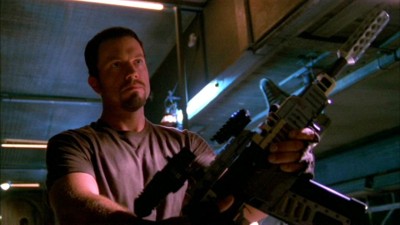
6. Firefly
Leave it to Joss Whedon to dream up a space show without aliens. The smart writing he brought to Buffy turned the universe into one big frontier, where those who didn't conform to authoritarian rule were forced to eke out their livings among outlying planets where the long arm of the law can't follow. Watch the way-too-short lived series in full before finishing with Serenity.
5. The X-Files
Pairing Scully the skeptic and Mulder the believer as they investigated the paranormal, The X-Files at its best was as good as any other TV show in history. Its greatness waned in the later years, but the early seasons did more than investigate the implausible; it accomplished it by taking aliens and conspiracy theories to the mainstream.

4. Buffy the Vampire Slayer
Based on a terrible movie with a mediocre premise—that a high school was built on the hellmouth where vampires, demons and other various devil-spawn would creep into California—Buffy became a surprising hit, even among academia ("Buffy studies" classes became popular after the series concluded). The show tackled teen issue as well as My So Called Life, metaphysical questions as well as The X-Files, all while a female protagonist fought like Bruce Lee.

3. Lost
J.J. Abrams convinced viewers to watch his sci-fi show by taking his sweet time to reveal that it was a sci-fi show. Filled with exceptional characters (man, I miss Mr. Eko), clever structures (flash forwards?), moral conundrums and more plot twists and hidden clues than 1200 websites can keep straight, it's kept the water cooler interesting the last four years.

2. Star Trek: The Next Generation
The original series was pioneering. Deep Space Nine and Voyager had their moments. ButTNG was head-and-shoulders the greatest Star Trek franchise. Jean Luc Picard. Data. Worf. The holodeck. The Borg. Gene Roddenbury must not have had a cynical bone in his body, and watching his characters explore strange new worlds, seek out new life and new civilizations, and boldly go where no one has gone before, I didn't either.

* * * * * * * * * * * * * * * * * * * * * *
The 12 Greatest Science Fiction Series of All Time
Posted by Paul Corvus in Science Fiction on July 17, 2011
A countdown of the top shows in Sci-Fi. If you are a fan of science fiction, don’t miss a single one of them.
12) Quantum Leap

Scott Bakula (who would go on to star in Star Trek: Enterprise ) played the role of Sam Beckett, a scientist who finds himself “leaping” into the bodies of different people during different time periods. This made for some interesting situations, because not only did Becket have to solve some sort of problem, but he also had to deal with the personal life of the person that he “leapt” into. Race, sex, location, time period, and culture all came up during the series’ run, which was from 1989 to its untimely cancellation in 1993.
11) Babylon 5

Some would argue it is the best Sci-fi series of all time. This politically and philosophically charged series ran from 1994-1998, and enthralled a wide fan base. The show centers around a space station (the fifth of its kind) intended to be a sort of bastion of peace in the galaxy. As we’ve learned from the real world and science fiction alike, peace can be a difficult thing to achieve.
10) The Outer Limits

“There is nothing wrong with your television. Do not attempt to adjust the picture.” Originally airing in the sixties in black and white with similar subject matter to The Twilight Zone, The Outer Limits was resurrected in 1995 and ran until 2002. Each episode dealt with a new sci-fi plot. The cryptic and enticing storytelling kept the viewer guessing until the very end, which often featured a clever twist. “You are about to experience the awe and mystery which reaches from the inner mind to the outer limits…”
9) Firefly

Joss Whedon’s Firefly only ran for one season, but was too good to be kept off this list. It was cancelled after one season in 2002 for various reasons – Fox marketed it poorly, and many claim the studio disagreed with some of its edgy subject matter. The show didn’t get the viewers it deserved, but huge DVD sales prompted a movie sequel to be made – Serenity, which was released in theaters in 2005. Some would describe Firefly as akin to what Han Solo’s story would have been like if he never met up with Luke and Obi Wan on Tatooine.
 Farscape
Farscape

Muppets have never been utilized in such an awesome way since The Dark Crystal. John Crichton, an astronaut slung into the other side of the universe by a wormhole, joins forces with a rag-tag crew on a strange alien ship. The show delivers on pretty much every level, which explains why it has become such a cult hit. Farscape ran for four seasons, and then was concluded with The Peacekeeper Wars .
7) Sliders

The fact that Sliders convincingly portrayed Jerry O’Connell as a super genius is in itself enough to give the show recognition. After said genius discovers a way to “slide” through parallel dimensions and visit various versions of earth (think the opposite of Quantum Leap), a group of people go on a journey and visit these other versions of earth. The catch is, they can’t get back. The series chronicles their quest to return to their version of earth.
6) Dr. Who
Never has a show undergone as many major changes while maintaining stability. Dr. Who centers around an eccentric time traveling alien who’s time traveling machine looks very much like a police box. The show began in 1963 and ran for over 25 years, and now a newer reinvention of the series can be seen on the Sci-Fi channel. It is fitting there would be a later version of a show that underwent so many metamorphoses.
5) Stargate: SG-1

Rarely does a mediocre Sci-Fi movie spawn an enthralling and successful series that churns out 10 seasons of quality programming. Stargate: SG-1 is an exception. The show centers around an elite team, known as SG-1, that travels through the “Stargate” – a gateway that uses wormholes to enable instantaneous travel between planets. One of the show’s strong suits is how it stays exciting, and at times dramatic, without taking itself too seriously. Also, it is hard to think of another show that has done more with a relatively low budget. Stargate: SG-1’s success paved the way for Stargate: Atlantis, a spin-off and great series in its own right.
4) Battlestar Galactica

The few humans that remain after the Cylon attack travel through the galaxy in search of a world they can call their own, they are hoping for a place called “Earth”. The Cylons are a race of sentient robotic beings that were once created by man, and now are out for blood. The 2003 miniseries spawned a 2004 series that is superior to the original 1978. With top-notch acting, storytelling, visual effects, and a flowing and engaging plotline, Battlestar Galactica has everything a Sci-Fi buff could ask for.
3) The Twilight Zone

While it only ran for five seasons, The Twilight Zone left a monumental impact on the genre of science fiction and television as a whole. The series changed the way that stories were told, and brought an edge that TV hadn’t seen before. The show was jam-packed with metaphorical references to global politics and culture that were taboo to tackle directly. The chilling twists and mind bending ideas it introduced are still pertinent today.
2) The X-Files

Everyone knows paranormal investigators Mulder and Scully; they are iconic figures of American television. Their supernatural and extraterrestrial encounters spanned nine seasons, and a feature film was made in 1998. Six years after the series wrapped, another movie is on the way. IMBD The X-Files: I Want To Believe hits theaters later this summer.
1) Star Trek

You didn’t really think Star Trek would be left off the list, did you? This includes both the original and The Next Generation incarnations. Speaking of icons, they don’t get any bigger than Captain James T. Kirk (and to a lesser extent, Captain Jean-Luc Picard) and the U.S.S. Enterprise. Star Trek has captivated generations of viewers with its unique mix of interstellar politics, bizarre science, and seductive green women.
Other series’ in the franchise include Deep Space Nine, Voyager, and Enterprise.
Read more: http://telewatcher.com/science-fiction/the-12-greatest-science-fiction-series-of-all-time/#ixzz1cHfU3RiA
* * * * * * * * * * * * * * * * * * * * * *
Post-Apocalyptic TV Series and Shows - Enjoying the Apocalypse
The Post-Apocalyptic landscape is one of the staples of blockbuster sci-fi adventure films and, surprisingly frequently, television series, including the most current series, The Walking Dead, which features a zombified post-apocalyptic setting.
I was going to cover both films and tv in this hub, but by the time I finished, I realized that post-apocalyptic tv shows deserve a hub all of their own, so here we go. Let's survey a few entries from the tv landscape of doom and destruction.
Unfortunately, not all of them are available on DVD and it seems to me that the apocalypse doesn't make for happy fun tv watching for a lot of people, so these shows -- with a few exceptions -- tend to be short-lived.
One new thing we are now starting on tv is reality shows based on post-apocalyptic and disaster survival notions. One is called The Colony. This is a reality show much like Survivor, where you are stuck with a group of people and have to figure out how to "survive". I have not watched this show, but I believe everyone is stuck in a warehouse together someplace.
Another show which is sort of related is Surviving Disaster. This is a show that features a former Navy SEAL. Each episode runs through a disaster scenario such as earthquakes, terrorist attacks, avalances, etc. I have not watched it, but the reviews are not awesome.
The Walking Dead

Source: AMC The Walking Dead
The Walking Dead is an AMC series based upon the popular comic book series of the same name. I think it is a very interesting choice for AMC, which tends towards more high brow entertainment like Mad Men. But I think it is a great opportunity for both us and them. After all, if the show is on cable, it doesn't need the same kind of audience numbers that it would need on Fox. So hopefully this means that The Walking Dead will actually last a few seasons. So far, I'm quite hopeful as the first two episodes that have aired were both awesome.
If you are unfamiliar with the series, you should give it a go. At this point, as viewers, all we know is that the world has been pretty much taken over my zombies, aka The Walking Dead. Our hero, Rick, wakes up in a hospital to find things have changed a lot while he was in a coma. And if that sounds like a 28 Days Later rip-off, well yes, it will seem highly familiar at first.
If you are not watching The Walking Dead already, you seriously need to get on that! You can always catch up with the already aired episodes by getting them from Amazon's video on demand service.
Jeremiah opening credits
No More Grown-Ups
One common scenario of destruction that seems to get the most attention from tv writers is the "all the adults have died" virus. No less than three different tv shows have featured a virus that has killed every adult on the planet, leaving only the kids to rebuild society.
First up is Jeremiah, which was a Showtime series that ran from 2002-2004. Starting Luke Perry andMalcolm Jamal-Warner, Jeremiah is set 15 years after the "Big Death" that killed everyone over the age of puberty, so now most of those children who survived are in their 20s. The main story is Jeremiah's quest to find "Valhalla", the location that his parents were headed to when everyone died.
Jeremiah is a fun series with surprisingly good performances from the two leads and Sean Astin joins the cast in season 2. If you like this genre, I highly recommend this show. It was created by J. Michael Straczynski, the guy behind the greatest science fiction series every made -- Babylon 5.
Other series with a similar apocalyptic theme are 2030 CE, a Canadian children's show in which everyone over the age of 30 dies and New Zealand children's tv series, The Tribe, where all the adults were killed during a plague and now the children and teenager's must fend for themselves. The Tribe is one of those exceptions to the life expectancy of a post-apocalyptic tv series. It ran for 5 seasons with 56 episodes in each season! In the uS it frequently re-airs on the WAM channel (part of Encore package).

"Nuts" to the Apocalypse!
So have you heard of Jericho? I'm willing to bet that you have. But I bet you haven't watched it since it is cancelled... again!
Yes, Jericho is the post-apocaylptic tv show that was cancelled, rescued from cancellation by an online campaign by fans to send thousands of bags of "nuts" to CBS, and then cancelled again after it still didn't find an audience during its mid-season turn this year.
Jericho is set in in a small town in Kansas shortly after most of the major cities in the US have been nuked by an unknown enemy. Starring Skeet Ulrich as Jake Green, the prodigal son who returns home briefly only to find he can't leave after the rest of the country gets nuked.
Jericho was actually a pretty decent show with some interesting story arcs that appeared to be developing, but it wasn't nearly as good as eitherJeremiah or the next show I'm going to talk about, Odyssey 5, so it doesn't surprise me that it was cancelled. I highly suspect that while we like the post-apocalypse on the big screen, most television viewers don't have a huge appetite for it. The last 7 episodes of Jericho are still sitting on my TiVo unwatched. I was pretty gung ho for it during season 1, but lost interest in the interim between its initial cancellation and comeback. Oh well. Eventually I am sure I will watch them. Probably during the summer when my other shows are on hiatus :)

Preventing the Apocalypse
In movies and tv, in particular, there's a growing sub-genre of pre-apocalyptic storytelling. Generally these are stories that give us glimpses of the results of worldwide devastation and then, through the wonders of time travel, give our heroes the opportunity to prevent the oncoming devastation.
In film, The Terminator is probably the best example of the genre. Then12 Monkeys. And on tv, we hadOdyssey 5 for one glorious season and during 2008 (and hopefully 2009!) we have the Sarah Connor Chronicles. Some might argue that Armageddonmay fit into this genre as well, but as we never even glimpse the world in its destroyed state, so I don't think it quite works. Time travel of some variety seems to be a necessary element of the true Pre-Apocalyptic sub-genre.

Odyssey 5
During a Shuttle Mission, five Astronauts witness the Earth exploding. They are then sent back 5 years in time by "The Seeker" in order to prevent the destruction of the planet.
As they work to prevent the apocalypse, virtually everything they do makes the situation worse and actually speeds up the timeline so instead of knowing they have five years to fix everything, they change events in such a way that they have no idea how much time they really have left.
Starring Peter Weller as Chuck Taggart (my favorite Weller character ever) and Christopher Gorham as his son, Neil -- Odyssey 5 is one of the best sf tv series I've ever seen and, sadly, it barely lasted a season on Showtime. But you can pick it up on DVD and it occasionally re-airs on the SciFi or Spike channels in the US and, I think, on Space in Canada.
We Can Fix All of the Mistakes
The Terminator Series
Terminator: The Sarah Connor Chronicles
The Sarah Connor Chroniclesessentially picks up where Terminator 2 left off, studiously ignoring the theme of T3 which is that the past is fixed and can't be changed. One of the things I love most about The Sarah Connor Chronicles is that we get to see far more of the future after Skynet than we have in any of the movies to date. In the movies we never saw more than teasing glimpses of what the future looked like after the machines turned on us, but the tv show has multiple characters crossing over from the future so we get to see a variety of flash-forwards.
Thomas Dekker stars as a really terrific John Connor. I've been really pleased with how John is being played throughout season 1. He's still a teenager, but starting to think for himself and insisting on making decisions that don't necessarily match what his strong-willed mother thinks is right. Lena Headey plays Sarah Connor. And Summer Glau plays the Terminator sent back from the future to protect John. They are both adequate, but not particularly note-worthy in my opinion.
The real break-out performance is delivered by Brian Austin Green (I can't believe I just typed that) as Kyle Reese's brother, Derek. It's insane just how much energy and excitement he brings to the show and partly it is by virtue of who he is playing, the brother of a much beloved character, but mostly it is simply that Green really delivers a great performance. I LOVE Derek and I love his relationship with John.
I really really hope this show comes back for a second season, but if it doesn't I will be able to console myself watching Christian Bale play John Connor in the Terminator 4 movie *g*

Survivors
Here's a show I haven't seen, but would love to get my hands on.Survivors was a BBC series that aired in Britain back in 1975 and it ran for three series. Produced by Terry Nation, Survivors is about a group of, ummm, survivors of a plague that wipes out 95% of humanity.
The series has such a cult following that the BBC announced late last year that they are planning to remake it -- so hopefully we'll see something in the next year or two. While, sadly, it isn't available on DVD in the US, you can buy region 2 DVDs of the series from Amazon UK.
I'm pretty enthusiastic about the idea of a remake since I've never been impressed by 70s BBC stuff like Doctor Who, but I sure love the new iteration of this show and suspect the success of Who and Torchwood are probably why the BBC is considering a new version of Survivors.
Updated: Season 1 of the new version of Survivors has already aired and they are now working on Season 2. The series is EXCELLENT. One of the best I've seen in this genre. I highly recommend that you get a hold of it, if possible.
TV Movies of the Week
In addition to the several post-apocalyptic regular series that have run, we've also been treated to a variety of TV Movies of the Week and a mini-series here and there.
Nuclear Attack from "The Day After"
The Day After, Threads and Testament
I don't know what kind of Kool-aid we were all drinking in the 80s, but apparently we were all worried that the world was going to end by nuke because there were several tv movies on the topic and these weren't your light-hearted "plague has killed all our parents, but we can rebuild society" type stuff. Nope, this was certifiably depressing, "I think I'll go kill myself before the nukes come and we all die of radiation poisoning" type stuff.
Fun. Not.
All three of these television movies were released the same year, 1983, and I can remember watching this crap and crying over it. Threads, in particular, is really just awfully depressing. I actually don't recommend any of these if you're into this genre for the escapism *g*
Check out the Flick Filospher for a great write-up on the three of them.
The Stand Opening Credits
The Stand Mini-Series
I have issues with the mini-series ofThe Stand, but they got a lot of things right, especially this opening credits crawl with "Don't Fear the Reaper" playing. Hahha! Okay, they definitely got some things right. I particularly liked the casting of Larry (Adam Storke), one of my favorite character's from the book and I think Rob Lowe worked pretty well as Nick. The scenes in New York were great, but I thought the exit through the Lincoln Tunnel could have been scarier. In the book, it is positively terrifying. I think that chapter is only truly terrifying thing Stephen King has ever written.
I think I would like the series much more if they had chosen different actors to play both Stu Redman and Randall Flagg. Neither Gary Sinise nor Jamey Sheridan worked for me at all in either role. Gary just didn't have the right kind of presence for me, and Jamey was neither charismatic nor scary enough to be playing The DEVIL.
Okay, I think that's a wrap for tv, but I'm almost certain there's stuff missing. So if you have any favorites let me know.
If you haven't had the chance, be sure to check out my hub on Post-Apocalyptic Books, Post Apocalyptic Video Games and my hub on post-apocalyptic movies.
* * * * * * * * * * * * * * * * * * * * * *
Five Prematurely Cancelled Science Fiction TV Shows
We all have our favorite TV shows which we love, the shows we grew up with, the shows we quote endlessly and the shows we collect on DVD. But there are the other shows, promising Science Fiction television series that might have been but were rapidly cut short just as they were getting started. This is dedicated to them.
1. Earth 2
Long before there was Lost, there was Earth 2, a series that shared much in common with Lost, a journey that ended in a crash landing in a mysterious place, individualistic survivors struggling to get along and a hidden agenda among their ranks and a conspiracy that is behind their presence here and is tied to the secret of the mysterious planet. Unlike Lost however, Earth 2's explicitly Science Fiction elements never resonated with audiences and its pairing with SeaQuest did not bring it the viewers that Earth 2 needed to survive. Despite the vigorous fan campaign which TV Guide noted at the time, Earth 2 was cancelled.
But before Earth 2 was cancelled by NBC the series unveiled a promising landscape and a backstory as well as characters with their own agendas, one of whom included Terry O'Quinn, who would later go on to play Locke on Lost. The mysteries of Earth 2 would remain mostly unsolved but Earth 2 itself would remain as a lamentable example of a series cancelled before it properly had the chance to fly.
2. Firefly
Few mentions of cancelled TV series' these days would be sufficient without mentioning Firefly. When Buffy creator Joss Whedon made the transition from fantasy to Science Fiction, the result was a TV series that fused the Western with the space series to make something that was entertaining and unique especially when fused with Joss Whedon's unique style, dialogue and sensibility.
Firefly however was a troubled series from the start. Like the original Star Trek its pilot was dropped and a new more audience friendly pilot was shot with the original pilot reborn as a two part episode. Firefly's ratings suffered from the beginning and it was rather clear that FOX was uncomfortable with the adventurous series. Before its full run was even complete Firefly was cancelled and the remaining episodes appeared on the DVD. While those episodes themselves like Heart of Gold were arguably quite mediocre, Firefly's cancellation attracted a deeply vocal fanbase that helped drive the demand for a Firefly film. Universal did indeed wind up making a Firefly movie, titled Serenity and written and directed by Joss Whedon, but the movie unfortunately bombed, thus entombing Firefly forever.
But nevertheless in its brief run, though it had lasted barely half a season, Firefly had created an intriguing universe, a mix of Western planets overshadowed by Chinese culture, an ominous central government with operatives reminiscent of the X-Files. The results were quite different than most Science Fiction series and produced a show well worth remembering.
3. Odyssey 5
Odyssey 5 is not a Science Fiction series most are familiar with but before Manny Cotto went on to run Enterprise's fourth season and produced some of its most brilliant episodes, including Azati Prime and Similitude, he created a Science Fiction series for Showtime known as Odyssey 5. Despite receiving high ratings, Odyssey 5 was killed without most viewers ever getting a chance to learn about it. Yet while it aired, Odyssey 5 showcased an intriguing mix of high and low Science Fiction, going from the destruction of the earth to Groundhog Day style implications of attempting to alter future events.
It is unknown where Odyssey 5 would have gone had it been allowed to continue running but there is little doubt that the resulting series had many possibilities best compared to Michael Piller's Dead Zone series. But Odyssey 5 did not get the chances that The Dead Zone got. It was an idiosyncratic Science Fiction TV series and those are always vulnerable even with a comfortable ratings margin. Executives rarely like Science Fiction and Odyssey 5 was beaten to death by Showtime with little to no effort made to save it. Manny Coto went on to Enterprise which too was cancelled. And from there he moved on to 24. Odyssey 5 is dead but the spirit, the potential of an original and different kind of Science Fiction TV series hopefully lives in.
4. Nowhere Man
Perhaps not a Science Fiction series in the true sense of the word, Nowhere Man embraced that form of paranoid surrealism which is often found in dystopian Science Fiction of a world gone awry and the natural course of things turned on its head. Airing in the early days of UPN, a now perished network, Nowhere Man was an intriguing experiment in storytelling with a good cast and a dark story.
At the center of Nowhere Man was the story of Thomas Veil, a photojournalist who took a photo of four men being hanged by soldiers in South America. That photo comes to haunt his life as in a matter of minutes, Thomas Veil finds his identity erased, his wife refuses to recognize him, his credit cards no longer work and he has no choice but to go on the run.
A TV series that foresaw many of the paranoid preoccupations of the X-Files and the War on Terror, danced regularly between the possible and the impossible as Thomas Veil, played by Bruce Greenwood, found himself in an impossible world and fighting a vast conspiracy that seemed to control everything. While the overall series seemed to be inspired by The Prisoner, the "island" was the world and the bright tones and wacky pop art overtones of that series were gone, replaced by an image of a grim world and a man who has lost his life and has no choice but to flee the hunters while scrambling for a way to strike a blow back at an enemy whose nature he does not quite understand and whose every revelation hides a deeper level of manipulation.
As the series progressed, Nowhere Man encapsulated the questions of free will and predestination and the need to see beneath the illusion embodied in The Matrix movies and as the series approached the edge, the revelations only became ever more disturbing. Nowhere Man was cancelled in its first year but its haunting legacy lives on.
5. Space Above and Beyond
Space Above and Beyond or SAAB was what Battlestar Galactica only attempted to be, a genuine TV series about a war in space against a mysterious alien enemy stripped of Battlestar Galactica's pretentious posturing, wailing music or attempt to comment on the great cosmic truths of the universe. Right down to its devastating first season finale, Space Above and Beyond nailed down what TV series like the latter seasons of Star Trek Deep Space Nine or Battlestar Galactica only attempted.
For its time Space Above and Beyond was a very expensive series to do and FOX had a notorious lack of patience with its Science Fiction series. Space Above and Beyond was cancelled with one season under its belt. The series was gone but aspects of it were incorporated in later shows such as Battlestar Galactica. Still Space Above and Beyond remained the demonstration of how a space war TV series should be done.
While these television shows are long gone, Science Fiction after all is a medium in which death is rarely final and there is always hope of a return to life from lifelessness.
* * * * * * * * * * * * * * * * * * * * * *
Five Essential Ingredients for a Successful Sci-fi Series
Posted by Paul Corvus in Science Fiction on August 16, 2008
Nearly every successful Sci-Fi series has most or all of these essential characters on its roster. Read on to find out what they are. Complete with descriptions, examples, and where to spot these characters in your favorite Science Fiction series.
The Muscle-Bound Tough Guy

This character always ends up losing their shirt, or getting it torn in combat, exposing chiseled arms and ripped abs. The tough guy usually has a mean streak, and may be unpredictable or a loose cannon at times, but in the end remains loyal. In many cases, they are trained in some sort of ritual combat, and have their own trademark weapon/fighting moves. It is not uncommon for the tough guy to have escaped from prison, have bounties on their head, and to have made powerful enemies who want revenge. Conversely, there is often someone who has wronged the tough guy, and they must deal out some serious payback.
Where to spot the MBTG: Running down long corridors evading weapons fire, on narrow bridges engaging battle, making sidelong glances at a superior, flying through the air during a dramatic explosion.
Examples: Teal’c (Stargate SG-1), Worf (Star Trek: The Next Generation), Jayne Cobb (Firefly), Ka D’argo (Farscape)The Smart-Alec Leader

Read more: http://telewatcher.com/science-fiction/five-essential-ingredients-for-a-successful-sci-fi-series/#ixzz1cHgDR5jD
Where to spot the Leader: In the company of green women, sitting in the captains chair staring ahead stoically, engaging in suicidal rescue missions, arguing passionately against a bureaucratic villain.
Examples: Captain James T. Kirk (Star Trek), Quinn Mallory (Sliders), Captain Malcolm “Mal” Reynolds (Firefly), Jack O’Neill (Stargate SG-1)
The Eye Candy

Where to spot the Eye Candy: With hair and makeup looking good even during battle, using her flirtatious manner to disarm opponents, looking worried during tense situations, offering advice and reflecting on personal experience during tough times.
Examples: Number Six (Battlestar Gallactica), Inara Serra (Firefly), Seven of Nine (Star Trek: Voyager)
The Nerdy Specialist

Perhaps a scientist, doctor, archeologist, engineer, or philosopher – the specialist has an essential knowledge or ability that no one else possesses that comes in handy once every episode or so. They may not know how to handle a gun as well, which they often get flak for, but they try. The specialist has a stout moral compass, and often protests objectionable issues. When the leader doesn’t take the role, the specialist can fill in as a capable negotiator.
Where to spot the Specialist: Spouting a befuddling lecture, hacking into a computer mainframe, deciphering a code or ancient language, “beaming” someone up, bypassing the circuitry on a jail cell door (which is conveniently inside the cell itself).
Examples: Dr. Daniel Jackson (Stargate SG-1), Prof. Maximilian Arturo (Sliders), Scotty (Star Trek)
The Non-Human Sidekick

This character is the crux of one of sci-fi’s most prominent themes: the exploration of what it means to be human. The non-human sidekick comes in many forms: an alien, genetic hybrid, ghost, robot, hologram, android, or mutant – but each one has an internal struggle between their human-like qualities and their separateness from the humans they spend time with. The non-human usually becomes more human-like over the course of the series, and other characters go to great lengths to remark on this. At times the fact that they are different can hurt them as well, and they are often outcast or suspected when something goes awry.
Where to spot the Non-Human: Engaging in practices such as recharging/meditating, discussing the philosophy of what makes one human, keeping pets or a garden.
Examples: Data (Star Trek: The Next Generation), Spock (Star Trek), Sharon Valerii (Battlestar Gallactica), Bender (Futurama)
Source: http://telewatcher.com/science-fiction/five-essential-ingredients-for-a-successful-sci-fi-series/#ixzz1cHgHZlRX
* * * * * * * * * * * * * * * * * * * * * *




No comments:
Post a Comment